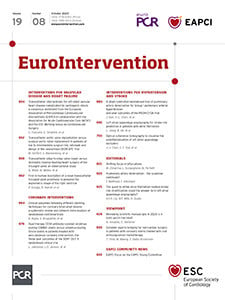An interview with Co-Chair Anna Franzone
What is the role of the committee?
The EAPCI Young Committee is dedicated to promoting the values of EAPCI amongst young interventional cardiologists. Together with the Chair, Dejan Milasinovic, and our committee members we promote opportunities in education, training and research programmes in member countries. To this end, we have identified three key areas. First, connecting young interventional cardiologists from different regions and countries to exchange experiences and foster mobility. Second, developing dedicated educational platforms, which specifically address the needs of the younger community. Third, encouraging young interventionalists to participate in the association’s flagship meeting, EuroPCR, by submitting clinical cases and research abstracts, as well as participating in the development of sessions dedicated to young interventionalists. Through all these activities, we ultimately hope to assist young interventionalists in the selection and pursuit of their preferred career pathways.
How does the EAPCI Young Committee benefit the community?
Our committee builds on the work of prior committees who, over the years, have established the EAPCI-PCR Fellows Course. This educational milestone is held annually at EuroPCR, representing a meeting point and a learning platform that attracts 200+ fellows and young interventional cardiologists. In addition, a series of sessions developed by PCR NextGen are offered throughout EuroPCR, with active participation of the EAPCI Young community. EAPCI Young Interventionalists have also participated in developing the Fellows Course in Krakow, dedicated to a regional audience. In addition, we support the work of other EAPCI committees by promoting applications for EAPCI fellowship programs, working towards the involvement of the EAPCI Young community in the review process of EAPCI scientific documents and co-developing mentorship opportunities.
How does the EAPCI Young Committee work with the EAPCI Young National Ambassadors?
The EAPCI Young National Ambassadors represent a link and a point of communication between the EAPCI and the young national communities. Building on this growing network, a series of EAPCI Young sessions, supported by EAPCI and the corresponding Working Groups of National Cardiac Societies, have been designed, with several in the pipeline for this year. During these sessions, members of the EAPCI Young Committee, together with the corresponding EAPCI Young National Ambassador, engage the local and regional audiences during national congresses. With this initiative, we hope to promote networking among young interventionalists and to work towards standardisation of educational practices.
How are topics chosen for educational sessions and how can EAPCI members contribute?
Educational sessions at the EAPCI-PCR Fellows Course are prepared collaboratively between the designated members of the EAPCI Young Committee and PCR NextGen. Building on the experiences from dedicated EAPCI Young sessions at national congresses, we plan to mobilise a wider network of peers in the planning and execution of future educational events dedicated to fellows and young interventionalists at early stages of their career.
How can EAPCI members become involved in the work of the EAPCI Young Committee?
We invite the young community to actively take part in the EAPCI-PCR Fellows Course and in EAPCI Young sessions at national meetings. Both initiatives provide meeting points for the young community and allow young interventional cardiologists the opportunity to be on stage and share their perspectives on the burning questions of our profession. For any enquiries or ideas, please contact us at [email protected] and [email protected].
NEWS
- Attending PCR London Valves 19-21 November? Don’t forget to stop by the EAPCI stand!
- Have you completed registration for the EAPCI Exam in Interventional Cardiology?
- https://www.escardio.org/Education/Career-Development/Certification/Interventional-Cardiology

